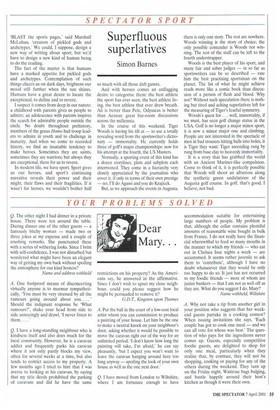Superfluous superlatives
Simon Barnes
'BLAST the sports pages,' said Marshall McLuhan, 'creators of pickled gods and archetypes.' We could, I suppose, design a new way of writing about sport, but we'd have to design a new kind of human being to do the reading.
The fact of the matter is that humans have a marked appetite for pickled gods and archetypes. Contemplation of such things cheers us on dark days, brightens our mood still further when the sun shines. Humans have a great desire to locate the exceptional, to define and to revere.
I suspect it comes from deep in our nature: a childhood with parents gives us people to admire; an adolescence with parents inspires the search for admirable people outside the circle. No doubt throughout prehistory, members of the genus Homo had troop leaders to admire in youth and to challenge in maturity. And when we come to recorded history, we find an insatiable tendency to make heroes. Sometimes they are saints, sometimes they are warriors; but always they are exceptional, there for us to revere.
In modern life, we have sport. Sport gives us our heroes, and sport's continuing narrative reveals their power and their might, their flaws and their fragilities. If it wasn't for heroes, we wouldn't bother half so much with all those daft games.
And with heroes comes an unflagging desire to categorise them: the best athlete the sport has ever seen, the best athlete living, the best athlete that ever drew breath. Ali is better than Pele, Odysseus is better than Aeneas: great bar-room discussions across the millennia.
In the course of this weekend, Tiger Woods is having his tilt at — to use a totally revealing word from the sportswriter's dictionary — immortality. He currently holds three of golf's major championships: now for his attempt at the fourth, the US Masters.
Normally, a sporting event of this kind has a dozen storylines, plots and subplots each intertwined. They come in a hierarchy very closely appreciated by the journalists who cover it, if only in terms of their own prestige — no, I'll do Agassi and you do Krajicek.
But, as we approach the events in Augusta, there is only one story. The rest are nowhere. Woods winning is the story of choice; the only possible contender is Woods not winning. The rest of the stuff can be left to the fourth understrapper.
Woods is the best player of his sport, and many fair and sober judges — in so far as sportswriters can be so described — rate him the best practising sportsman on the planet. The list of what he might achieve reads more like a comic book than discussion of a person of flesh and blood. Why not? Without such speculation there is nothing but tired and aching superlatives left for the measuring of Tiger's fearful symmetry.
Woods's quest for.. . well, immortality, if we must, has seen golf change status in the USA. Golf is no longer a major minor sport, it is now a minor major one and climbing. People are not interested in the spectacle of men in bad trousers hitting balls into holes; it is Tiger they want: Tiger ascending rung by rung from base clay to heavenly immortality.
It is a story that has grabbed the world with an Ancient Mariner-like compulsion. Come to think of it, it is perfectly possible that Woods will shoot an albatross along the synthetic green undulations of the Augusta golf course. In golf, that's good, I believe, not bad.


























































 Previous page
Previous page